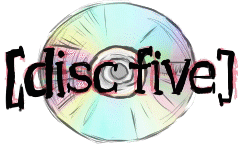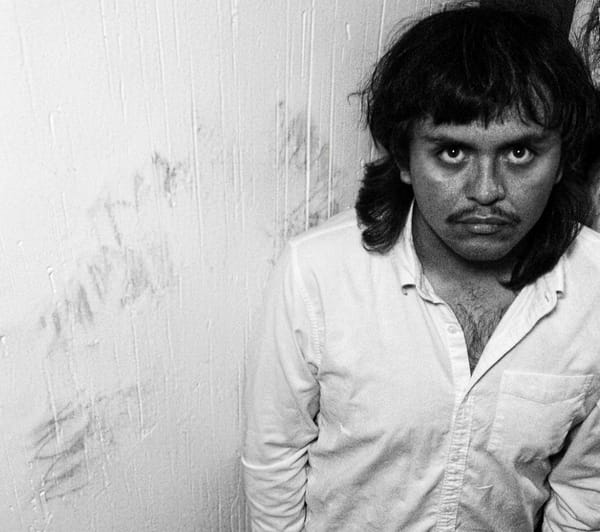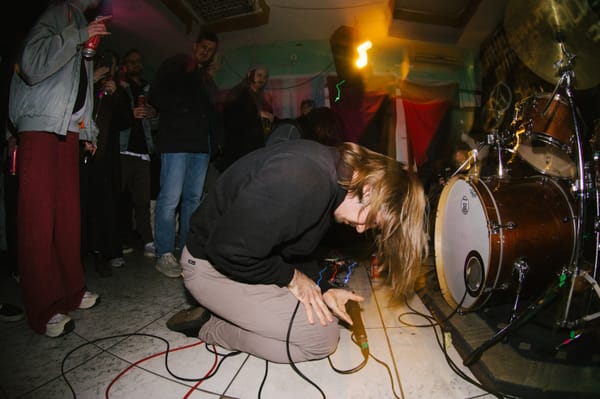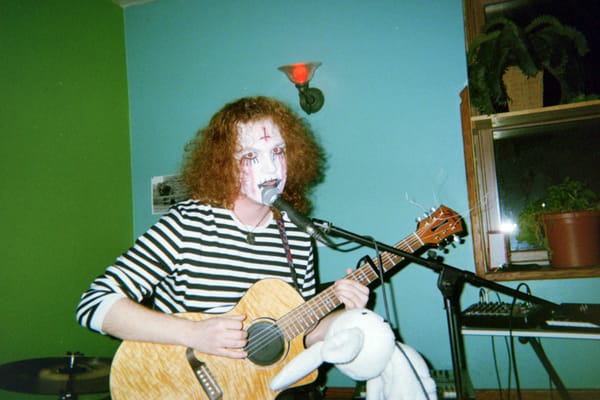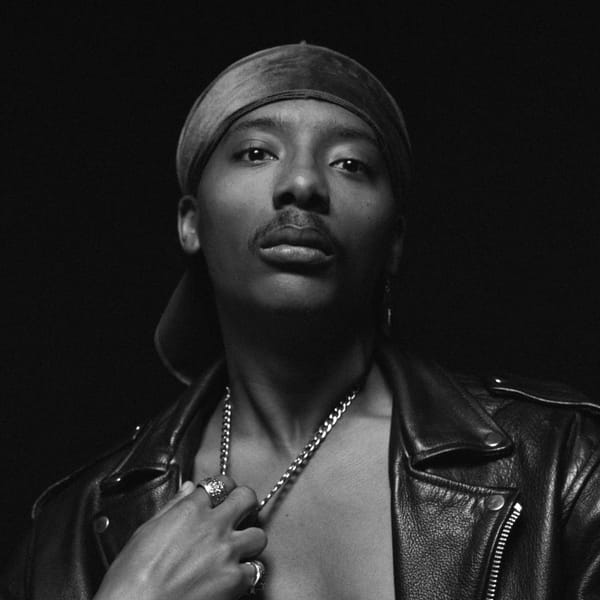The Heist Revenge discusses his one-man FLCL rock opera, For Losers Craving Love
The Heist Revenge (aka Zack Lorenzen) digs into his latest album, For Losers Craving Love, and talks about getting to "fanboy out therapeutically."
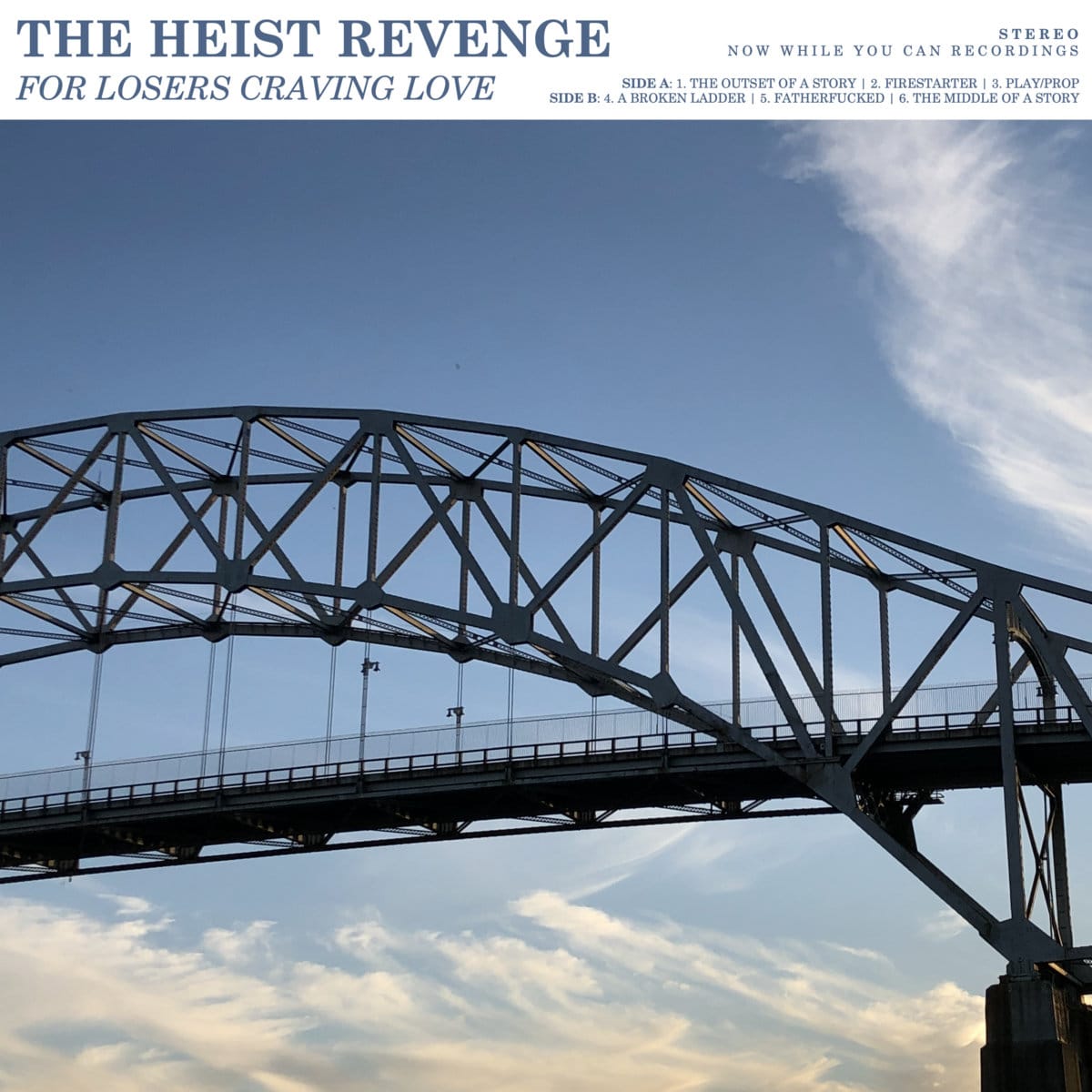
When you find out that a “band” is actually just one guy and a guitar, what do you expect their music to sound like? Acoustic emo? Folk punk? Lowkey chamber pop?
Or do you picture a sprawling rock opera with full instrumentation? Because that’s what you’ll hear on For Losers Craving Love, the debut album from Zack Lorenzen’s solo project, The Heist Revenge. He’s the guitarist, the bassist, the keyboardist, and the drum programmer. He’s the sole singer, even in the layered gang vocal portions. He wrote all those post-rock interludes and prog bridges. He recorded the doorbell and crickets you hear on “The Middle of a Story.” He produced it, he mixed it, it’s all him.
It didn’t surprise me when Zack told me that Parannoul’s DIY masterpiece To See the Next Part of the Dream was something of a game-changer for him, because The Heist Revenge elicits that same feeling of, “wait, this is all one guy?!” With these kinds of solo DIY projects, there may be mixing missteps or an unclean vocal take along the way, but who cares? Rick Rubin isn’t going to produce any anime rock operas - this is a job that can only be done by a guy in Connecticut with a laptop.
Each of the album’s tracks are structured around the six-episode 2000s anime FLCL, with each song written from the perspective of a different character (Naota, Mamimi, Ninamori, Amarao, Kamon, and Haruko, respectively). For Losers Craving Love sounds like the anime’s muted color palette more than it sounds like alien panty shots, largely steering away from the more outrageous elements of the series (aside from a few fantastical moments in its finale). Instead, it spends its runtime expanding on the series' themes of restlessness and nihilism (both the depressing kind and the optimistic kind).
But let me stress that you don't need to watch FLCL in order to enjoy this album. “I didn't want it to be inextricably tied to this franchise that a lot of people will not have seen,” Zack explains. “I wanted it to have its own sense of personality and identity, and directly address the themes that that series gets at - without having to lean on it for all of its actual firepower.” So no worries if you don’t know Naota - you’ll still recognize the loser craving love.
Zack got on a Discord call with me and we talked about the trial-and-errors of budget music production, writing songs about yourself as if you were someone else, and of course, FLCL.
Tell me about how this concept album came to be.
Well, in 2020, I recorded my first good EP, which was After Never Comes. That EP came out in June 2020, which was like, the peak of lockdown craziness. I think we were still all pre-vaccine and peak social unrest at that point. In times of my life where things seem especially chaotic, I revert back to that child-like sort of state and ask myself, “what did I enjoy doing when the world seemed a simpler place to exist in?”
So, I rewatched a bunch of anime. And I got around to rewatching FLCL. And something about it hit me on that watch. I think for the first time, I understood in a critical sense why I liked it so much.
So you wrote this sporadically between After Never Comes and [your 2023 EP] Scorched Earth Amusement Park?
Well, For Losers Craving Love was a weird case because lockdown was so crazy. I had the inspiration point and I realized, like, “oh, I have enough material here, and the riffs and ideas fit FLCL.” I sat down and over the course of a week and a half or so, I had first drafts of everything written. And then I waited, because while I felt like I more or less understood what I wanted the release to say, I didn't have enough technical know how to make it sound good as a production. So I thought, “what else can I do in the meantime as a tide over until I can say I actually have some confidence in what I'm doing?” That's why Scorched Earth Amusement Park came out first. Even though it was written after this album, it was kind of my trial and error case of, “okay, how do I make songs sound listenable?”
So For Losers Craving Love was, like, the big event and everything else was practice.
Yeah. I did not want to have one of those cases where I look back on it in ten or fifteen years and go, “oh, man, I wish that wasn't part of the integral lineup of my discography,” you know? I wanted it to actually stand up well. And I think I got halfway there…like, it's obviously not professionally mastered, so that's kind of a hurdle.
The majority of the musicians I’ve talked to are self-producing, so their albums won’t always be professionally mastered either. But it kind of draws me to them more.
Right? And even if it's not necessarily up to a professional standard, as long as there's still ideas worth talking about - that's all art is anyway, you know, the ideas. Maybe it doesn't have the glitz and the polish of a professional production, but if you still feel something from it, people can overlook that.
What were specific lessons that you learned from doing the more recent EPs?
One of the most important things is that I started to use EZdrummer. When I was recording my super old stuff, I had an actual drum kit, but I didn't have any of the know-how to mic it. When I realized it sounded awful, I was like, “I'm just gonna record acoustic songs for a little while and see how that goes.” But it's not impossible to record songs without live drums! You just have to be good at editing the drums and have a good drum editor.
When I graduated, though, I was broke as shit and could not afford one. After Never Comes had drum samples that were all the GarageBand built in drum kit. And because that's a free program that comes with your computer, the diversity of the samples that it afforded me was very limited. Which is why everything on that EP is like, very straightforward punk rock / post-hardcore, because that's really the only sound that those drum samples were good enough to accompany. Scorched Earth Amusement Park was kind of my experiment testing the EZdrummer software and seeing what I could do with that.
…Oh, and it also helps that I didn't record vocals on For Losers Craving Love like I did on the previous two EPs - where I had just come off a sinus infection! My throat was still recovering when I did vocals for those last two EPs. And you may think - “why would you not just wait the previous two times?” Because we were in a pandemic and I thought I was going to die!
God, yeah. Or even like, you couldn’t know whether it would be a permanent sinus infection.
Right. I didn't know if I would get better, so I was like, “well, fuck it, we're trying it.”

To circle back on what you said earlier - when you watched FLCL during lockdown, what hit you differently?
Well, I had first seen it when I was a relatively young teenager, at which point I was like, “ahaha, wow, wacky anime, cool robots.” I saw it again when I was 17 or 18 and I was like, “oh shit, this is actually really biting and clever and artistically interesting.” And when I revisited it in 2020 at the height of social unrest, I was struck by how it didn't need to say on the nose, “hey, all the adults in your life are just flawed people trying to project a sense of maturity that they don't really have because everything is crazy.” I was a little shocked that it took me that long to realize not only that that’s a message in the show, but that I had these suppressed emotions of, “okay, I'm not a kid anymore, I gotta be an adult. And anything that's the kid part of me still - I can have that, but it can't be my outward facing self because that's embarrassing.”
So I started to kind of unravel that [with the album], and it was a little therapeutic to eventually be like, “man, who fucking cares?” Just do what makes you happy and gives you meaning. Life is what you make of it, and if you don't make anything of it, that's going to be on you. I think really having that drive and that renewed sense of purpose behind wanting to write songs - and to be able to kind of fanboy out therapeutically - allowed me the clarity to actually see something in the show's story that I think a lot of people either don't notice when they first watch it, or they just kind of take it for granted.
Was it rewarding to write through the eyes of another character instead of as yourself?
There are multiple objectives that doing this album kind of fulfilled for me. One of it was like the purely technical sense of, “oh, I want to get better at how to work this gear.” The other is…I still kind of had that stigma in my mind of like, “are you still the guy singing depressed songs with an acoustic guitar? Are you really? Or are you just that but louder?” I wanted to escape the trappings of pinning my writing down as me - as the individual, as the songwriter, as the narrator. I still wanted to touch on a lot of things that I found compelling or that I needed to sift through and interrogate about myself - but I didn't want to approach it from the lens of like, “hey, here's a didactic, superlative voice trying to push a feeling on you.”
Did putting yourself in a character’s shoes give you wiggle room to explore new parts of yourself?
You can get a thought out and realize after the fact, “oh, that's not, like, to my name, but I was really talking about myself there.” It takes the pressure off of you a little bit, and you can hold yourself accountable to things that you didn't even realize until you turned the camera back around and focused it at somebody else.
I think I did that most incisively with “A Broken Ladder.” I have this mentality where, if I don't feel comfortable with a thing naturally, I write it off as, like, “yeah, you're never gonna get better at that one thing, just focus on what you're already good at.” But that complacency can deprive you of a lot of really interesting opportunities and experiences. There was a time in my life where I was rerouting to that sort of blanket dismissal of potential pretty often. And writing it into that song helped me pick it apart, like, “dude, that's on you, stop being a fucking sour puss about things. It can be freeing to not be great at everything! You don't have to put that pressure on yourself!”
This is a little presumptuous, but when I saw your breakdown of which character you were embodying for each song, my first thought was, “oh, I'm sure the teenage boy Naota was pretty easy to write as opposed to becoming the alien Haruko or the sleazy shitty dad for ‘Fatherfucked.’” Unless…did you find that you related to the shitty dad as you wrote…?
No, thankfully! There's different layers of distance between me and the character in all of these. I think it's funny that you pick the Naota one out as easy. [For “The Outset of a Story”] I kind of tried to put myself in the shoes of where I mentally was when I was ten years old and in a garage band in third grade with me and my pals who were trying to cover “American Idiot,” right? There's a sort of nostalgia I had in embracing being a little snotty piece of shit kid who at least has the right idea, cuz I was also a snotty piece of shit kid, you know?
But at the same time I wanted to be like, really hyper-aware that if people are checking this out and that's the first song they hear of anything I've done, they’d think, “oh wow, this 28 year old's kind of a fucking loser,” right? But I think ultimately it was more important to have that set the tone for what comes afterward than to be worried about people being turned off by misreading it.
Alright, so walk me through your approach for each of the songs. We’ve talked “The Outset of a Story” and “A Broken Ladder,” so tell me about Mamimi’s song, “Firestarter.”
That song is the oldest one on the record. I wrote that during my senior year [in college]. A girl in an adjacent dorm had started setting things on fire. It had become a consistent thing, the police got involved. And while we were waiting to find out who was doing it, I started to write a song about it. Before graduation, she had gotten arrested and brought into court. Nobody was injured. Any property damage was only because sprinklers kept going off and stuff got wet or whatever. She didn’t face serious jail time and now has a decently happy life, as far as I know. And that kind of made me key into the realization that there's more to people's stories than just the parts of them you interact with. Because my only experience with this person was when she was raising hell and being an absolute menace, right? But like, that was just a small chunk of her life that included a lot of other stuff before and has included a lot of other stuff since. And you can't necessarily judge people for their low point. So when I ended up writing a bunch of new material for this record, that was one of the song riffs that I revisited. And it occurred to me - “oh, that's basically Mamimi.”
Mamimi is also inferred to have a happier ending. I wanted to get at the desperation of not knowing where to turn while also leaving open the reality that people usually don't turn to that sort of “evil” because they're psychopathic or malignant at heart. It's usually a big old clusterfuck of circumstances beyond their control. Most of the time they don't want to be doing the thing that they're doing, they don't want to have to cope with it the way that they're coping with it. They would rather have a happier existence. And if nothing else, I hope that “Firestarter” emphasizes the search for an out, even if it's finding it in temporarily wrong places. I think more people struggle with that than they realize.
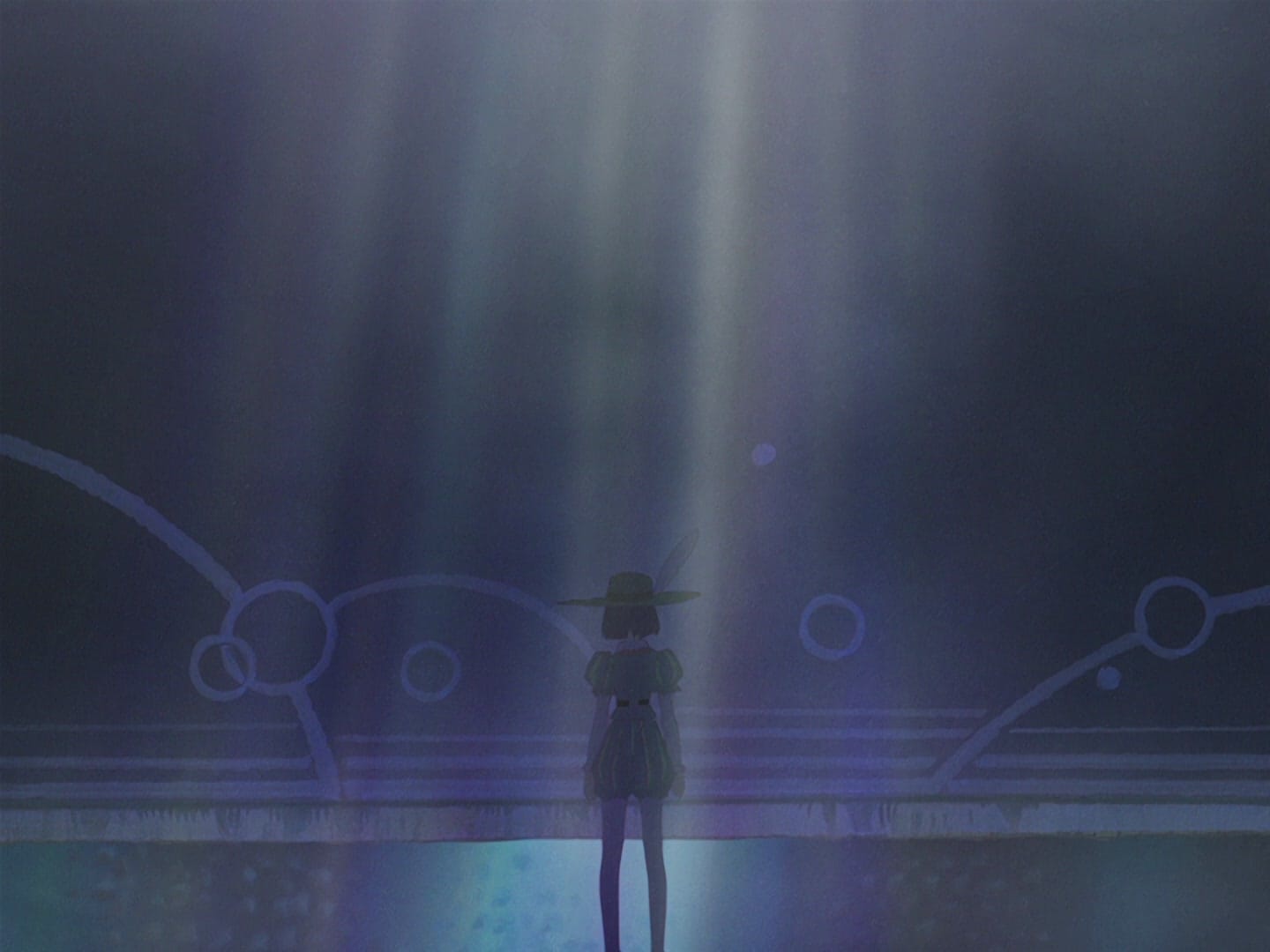
What about Ninamori and “Play/Prop”?
This was another more self-incisive one. So, I've always personally had an aversion to describing my own experiences with romance or sexuality in any super label-y way, but it has dawned on me that I'm probably somewhere on the aro-ace spectrum. I don't have zero sex drive but I also don't have a particularly strong one. I don't have zero romantic feelings towards people that I love, but I also don't necessarily think of them as strong enough to prescribe to one extreme or the other. And part of all that is being incredibly self-conscious about my own role in these sorts of relationships. I am one to very much clam up and hold back what I may or may not want to do because I feel safer erring on the side of caution. And in previous relationships, they don't want to have to take that role for me.
“Play/Prop” tries to dissect both sides of that relationship where one person is too hesitant to make the move, the other is too proud to make a move. And so it just kind of stalls out and there's this tension of like, “I know that you know that I know what you want. Why are we not doing the thing we both want?” And it peters out and nothing really happens and it causes more frustration than it solves. I found that one very fulfilling and rewarding to actually get out on paper. I really didn't know what I was getting into until I just rambled a bunch of lyrics onto a notes document. And I looked at it all and I'm like, “yo, this is another song about yourself, you fucking idiot!”
I’m really interested to hear about the last two songs, because they seem like the ones that would be most outside of yourself.
Yeah, the final arc of the record is when I really embrace not being myself. “Fatherfucked” is in part an indictment of the dad in FLCL. But the more I wrote it, the more I found it reflective of friends' fathers who I knew growing up, who I have always gotten bad vibes from - only for my friends to reveal to me when we're both adults, like, “oh, yeah, my dad beat me as a kid.” I had asked a couple of those friends, like, “hey, I'm thinking of putting out this song from the perspective of a really shitty person that you will know a parallel to in your life. Does this rub you the wrong way or does it feel distasteful that I’m singing this?” And one of my buddies responded, and said, “I think that it's easier for people to recognize how that behavior is gross if it's presented in a new, relatively neutral light.” Because if someone were to write a song saying, “hey, don't beat your kids, don't be a shitty deadbeat,” it's like, obvious knowledge. A song like that doesn't do anything to shed a new light on that behavior. Whereas approaching it from the perspective of someone making excuses makes how bad they are all the more transparent in a way. It's kind of cathartic in a way, to see that as naked as it is.
In a lot of these other songs, I'm trying my hardest to still make elements of them relatable or at least present threads of thought that are broadly applicable to most people's stations in life. And in this one, I wasn’t trying to do anything like that, and I think that led me to turns of phrase that I don't think I ever would have thought if I had to keep that filter on. I was as blunt as possible. Like, I don't think there's any more nuance to grasp beyond a line like, “I make the dough in this house so you'll follow my rules / She can do what she wants, preferably in my room.”
Okay, so how about the big finale - Haruko's song?
Haruko's was actually the hardest one for me to write. Her character is so tied to the minutiae of FLCL's silly robot nonsense that it's hard to really encapsulate what her character is. So, like, this medley starts out very tender, homespun, and honest. Part two reprises “Outset of the Story,” and it takes how Naota in that song is very much like, “this is why my life sucks.” So Haruko comes in and is like, “that's right, your life does suck. But eventually, you'll have a little more control over it and you won't be as bored.”
It all comes to a head in that final section where she decides to leave - to stay in pursuit of the thing that she wants and not get tied down. And all the people whose lives she's impacted are still struck by her presence even as she goes. And I thought there was something interesting in that. You can't hold back people who want more. Sometimes you gotta let them chase even if they're not really gonna be able to harness the thing that they're going for. And whereas “A Broken Ladder” had the inverse perspective of, like, “you're not going to get that, why even try?” - this one's convinced that they're going to get it and they're going to keep chasing it no matter what.
So with that framing in mind, I personally found more meaning with this song by twisting that into an angle of, “I really want to make music a thing that I do. I want storytelling to be a thing that I do. I want this to be the thing that lives on after I'm gone in the world.” And I'm not gonna roll over and say that I can't have it for some arbitrary reason! I'm going to fucking run after it and grasp it and try to materialize it and make it a thing. And when I'm no longer here, you will at least know that I did it.
You can listen to this album and the previously mentioned EPs over on The Heist Revenge's Bandcamp page. You can also watch a full album lyric video over on YouTube.
